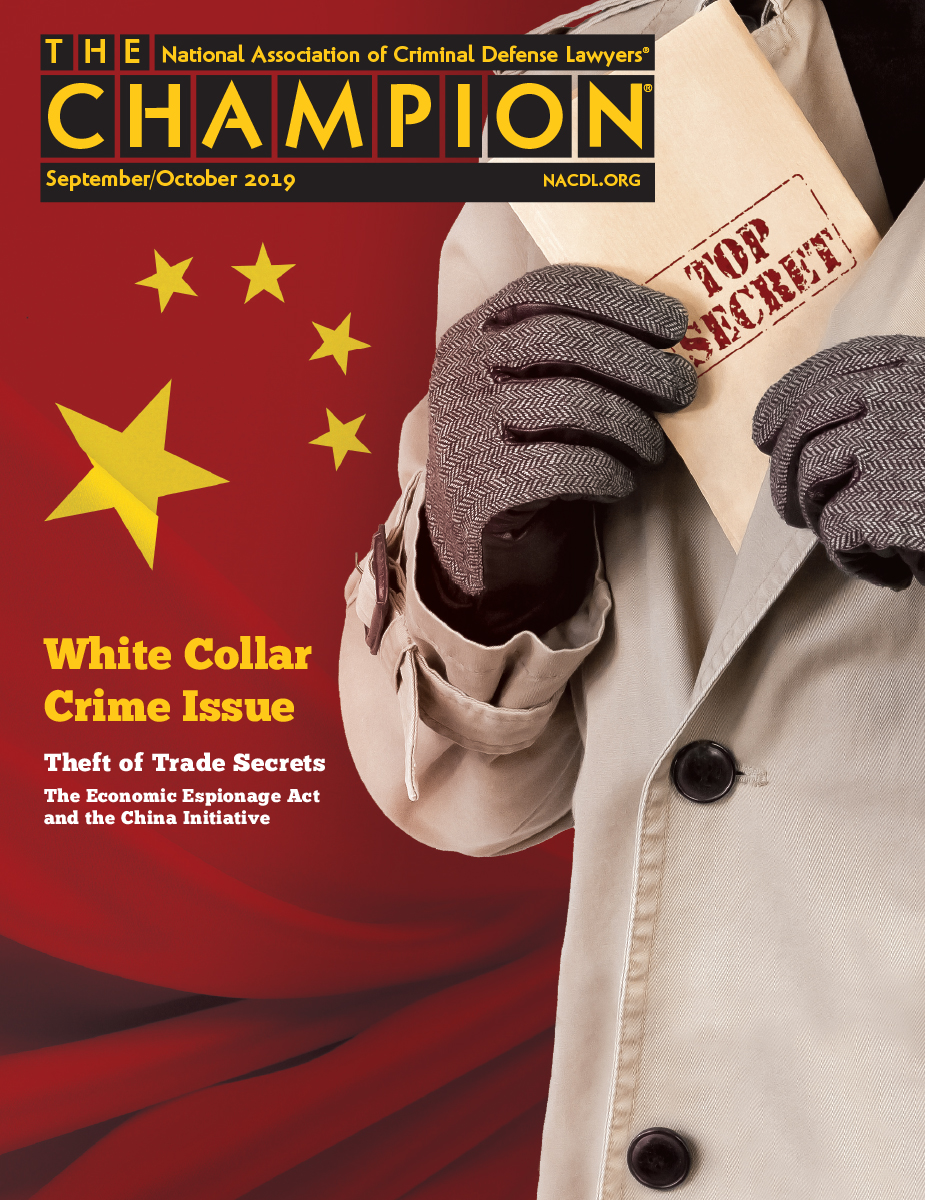September/October 2019

Trade secret theft is a hot button issue for the government. Defense lawyers must be ready when prosecutors unveil well-investigated cases that delve into highly technical materials.
Articles in this Issue
-
Affiliate News
What events are NACDL affiliates hosting this month? Find out here.
-
Book Review: Cardiac Arrest by Howard Root and Stephen Saltarelli
This month Andrew George and Kyle Clark review Cardiac Arrest: Five Heart-Stopping Years as a CEO on the Feds’ Hit-List by Howard Root.
-
Defending Hippocrates: Representing Physicians in the Wake of the Opioid Epidemic
In the wake of the opioid epidemic, state and federal prosecutors are becoming aggressive in prosecuting DEA registrants who deviate from professional norms. If a physician prescribes controlled substances “for other than a legitimate medical purpose” or “outside the course of professional practice,” he or she faces up to 20 years in prison. However, through pretrial motion practice, jury instructions and expert witness testimony, practitioners can tip the scales by narrowing the applicable standard.
-
From the President: Unleashing the Power of NACDL and Our Affiliates
NACDL and its affiliates opposed ABA Resolution 114 because it called for legislatures to adopt laws that would significantly alter the law with respect to sexual assault crimes.
-
Honest-Services Fraud in the Private Sector After Skilling v. United States
Continuing Vagueness and Resulting Opportunities for Clients
The U.S. Supreme Court saved 18 U.S.C. § 1346 and the honest-services doctrine from the void-for-vagueness dust heap in Skilling v. United States. Jonathan Jeffress and William Zapf explore certain “limiting principles” courts have followed that may be avenues for challenging an honest-services prosecution. In addition, they include a brief survey detailing how circuit court pattern jury instructions cover honest-services fraud.
-
Is It Time to Revisit the Corporate Privilege Against Compelled Self-Incrimination?
In Hale v. Henkel (1906), the Supreme Court held that an officer of a corporation could not assert the Fifth Amendment privilege against compelled self-incrimination on behalf of the corporation. The authors argue, however, that the basis for Hale is no longer valid. For the right client, defense attorneys should consider recommending assertion of the privilege.
-
NACDL News: NACDL Honors Champions of Justice in Philadelphia
NACDL News for August 2019.
-
NACDL Salutes ‘Second Chances’ Heroes
NFCJ 2019 Awards Dinner | Philadelphia, Pennsylvania
-
Storm Clouds on the Horizon: Private Equity and the False Claims Act
Philadelphia litigator Alexander Owens discusses two cases that may reflect a renewed focus on private equity firms in the False Claims Act arena. Lawyers representing private equity firms should strive to understand the unique financial and managerial dynamics that place many private equity firms in the government’s crosshairs.
-
Theft of Trade Secrets: The Economic Espionage Act, China Initiative, and Silicon Valley
Prosecutions alleging theft of trade secrets have been creeping upward since 2009. White collar practitioners must become fluent in the language of the Economic Espionage Act and be on alert that civil trade secret litigation can easily lead to criminal charges. Defense counsel should expect tailored and well-investigated cases by prosecutors unafraid to delve into highly technical and complex materials.
-
White Collar Crime Policy: Wartime Suspension of Limitations Act
Practitioners defending clients against federal fraud charges or related conspiracy charges should be aware of the Wartime Suspension of Limitations Act, particularly lawyers working on defense procurement cases.
